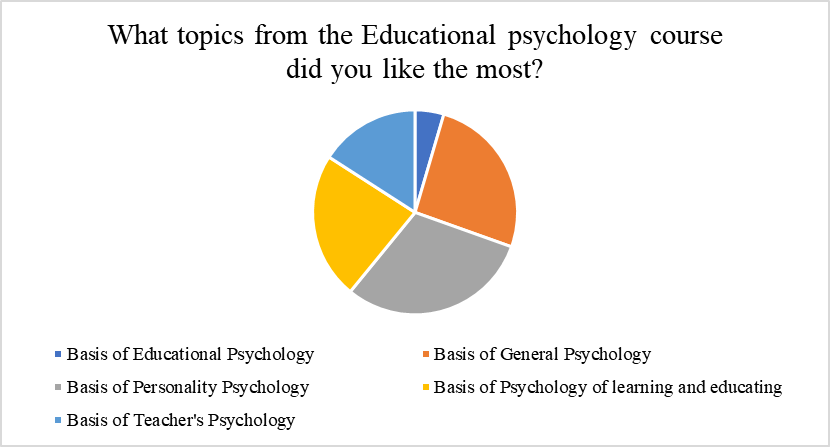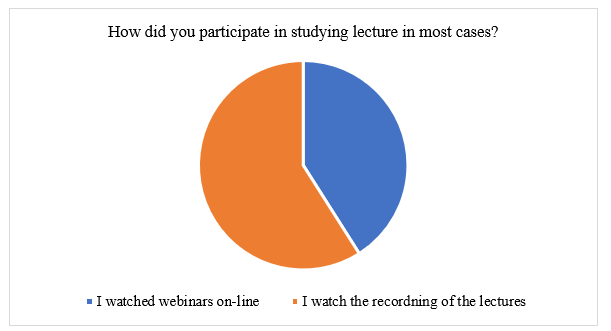Abstract
The article examines the efficiency of the distance learning module for the Educational Psychology course in the terms of pre-service teachers' education at the Lomonosov Moscow State University. What conditions should be taken into consideration while maintaining the course; what content is needed for pre-service English Teachers? The purpose of the study is to examine the efficiency of the course in terms of lifelong learning including the study of the conditions of successful integration of distance learning in teacher education. The following research methods were used: pre and post surveys, questionnaires to analyze pre-service teachers' perception of the course, comparative method, case study and the experiment conducted throughout four academic years. The findings show that distance learning course is considered as effective, in particular for those who reside far away from the education centre. Moreover, basing on pre-service teachers’ answers and case studies we have identified the topics and areas that need to be covered during teacher education. It should be noted the distance learning course helps pre-service English teachers not only enlarge their knowledge and skills in Educational Psychology but also benefit from observing how different ICTs can be used in educational process. Finally, it encourages head teachers to constantly improve the efficiency of the Educational Psychology course
Keywords: Teacher educationeducational psychologydistance learning
Introduction
Lifelong learning has proved to be one of the most important trends in education today. To realize the purpose of education, there exist a full range of pedagogical approaches, techniques and ICTs. In the increasingly developing world, the value of time is evident. Consequently, distance learning has become a popular mode of higher education among students all over the world.
Distance form of education for adult learners
Distance learning first appeared as a correspondence course at the beginning of the 19th century and provided many with the opportunity to participate in the educational process (Albrechtsen, Mariger, & Parker, 2001). Later, distance learning acquired richer technical possibilities with the rise of video-conferencing, the internet and the satellite (Salimi, 2007).
At present, it significantly impacts on the organisation of the whole educational process, especially in the light of adult education. Recent surveys conducted on adult education and aspects that needed to be taken into consideration while constructing a distance educative environment (Bozkurt et al., 2015; Cleveland-Innes & Garrison, 2010; Moore & Kearsley, 2012; Muilenburg & Berge, 2001) revealed that more and more adults prefer distance learning to face-to-face education as it implies the choice of place and studies.
In the case of this study, the decision to choose distance learning has been justified by several reasons. The first one is most of the pre-service teachers doing this course were not citizens of Moscow or lived in the Moscow Region. Hence, they would have to spend several hours to get to the University. Another reason was related to the work schedule of the students, as many students finished their work late in the evening depending on their schedule. Thus, the possibility of watching recordings of webinars and doing their homework at any time was of great value and importance for such students. Therefore, it is relevant to notice that the distance learning version course was one of the strongest benefits for our up-and-coming English teachers.
The need to understand Educational Psychology for pre-service English teachers
According to Vygotsky (1997) knowledge of Educational Psychology allows for a better understanding of the process of perceiving knowledge and forming skills as well as to organise the learning process properly.
So, in terms of professional retraining, this distance learning course was specially designed for adults with pedagogical education (not as English teachers) but who want to be English teachers. The course was elaborated by the teachers at the Lomonosov Moscow State University, at the faculty of foreign languages and area studies. In this course, pre-service teachers acquire first the theoretical basis of teaching and then turn to practice. Thus, they study such disciplines as Pedagogy and Educational Psychology during the first term of the academic year. The inclusion of Educational Psychology into basic pedagogical education is explained by the necessity to know and understand psychological process of forming and developing learning skills, in this case, to know how to effectively develop skills in reading, listening, speaking and writing among students of different ages or how to deal with lack in motivation during the lessons. As a result, head teachers decided to include this discipline in the course.
Problem Statement
Lifelong learning presupposes the opportunity to change profession during one’s life. Nowadays, technological possibilities are endless, affording great opportunities for learning and expansion. With this in mind, the Lomonosov Moscow State University has implemented a distance learning course for Education Psychology subject as a means to provide more opportunities for those who wish to become teachers. In this respect, the problem statement relates to the effectiveness of the distance learning course for the Educational Psychology subject in terms of pre-service teachers’ education at the Lomonosov Moscow State University.
Research Questions
The research posed two main questions that, in the author’s opinion, need to be answered in order to prove that distance learning can be effective in teaching Educational Psychology for pre-service English teachers.
To be effective, what content is needed for the distance learning course to teach Educational Psychology to pre-service English teachers?
To be effective, what conditions should be taken into consideration while implementing the course?
Purpose of the Study
The purpose of the study is to examine the efficiency of the distance learning course for the Educational Psychology subject for pre-service English teachers in terms of lifelong learning including the study of the conditions of successful integration of distance learning in teacher education at the Lomonosov Moscow State University. In other words, this research seeks to understand whether the distance learning form of such a course is efficient for students. For that, the primary consideration is the construction of the course content, and, secondly, the proper conditions for the course implementation.
Research Methods
The following research methods were used in the entire study conducted throughout four academic: pre and post surveys, questionnaires to analyze pre-service teachers' perception of distance learning course, comparative method, and case studies years. However, for this study, not all the data from these methods were reported. What is reported her is only the findings to answer the research questions.
The sample that was used in this study comprised 56 students taking the distance learning course for the Educational Psychology subject for pre-service English teachers at the Lomonosov Moscow State University.
Findings
The findings below are reported in accordance with the research questions:
The content of the course
The first research question dwells upon the content of the distance learning course for Educational Psychology which helps to define the real need of teachers in psychological knowledge.
The subject of Educational Psychology comprises several divisions of Psychology such as the Basics of Educational Psychology, General Psychology, Personality Psychology, Psychology of learning and educating, and Psychology of teacher’s activity.
The after-course survey contained a question about the divisions that students preferred. It should be noted that the respondents had the option of choosing more than one answer for this question. According to the results, the vast majority of pre-service teachers were in favour of the following division of content for the distance learning course for Educational Psychology subject. Figure

Proper conditions of the course realization
One more question is aimed particularly at the form of the teaching process. We should understand the suitable conditions for our students to start and continue up to the end the educational process. According to Salisbury, Pearson, Miller, and Marett (2002), interaction with groupmates and a teacher could easily be the key points of a successful distance course. It is vitally important to find the answer to the proper conditions of the course implementation in order to properly organize the course for optimal benefit for the students.
Another interesting ratio of answers was found in the light of the following question:

This shows that more than a half of the students preferred (depending on circumstances) to study with the help of recordings than be present on-line.
In addition, we asked our students about some challenges that they experienced during the distance learning course. The following emerged: shortage in discussions with groupmates (20%) and shortage in discussing problems with the teachers (19%). These results show that these are main areas that need to be addressed in order to improve the course.
In general, the findings show that distance learning course for the Educational Psychology subject for pre-service English teachers at the Lomonosov Moscow State University can be considered effective, in particular for those who reside far away from the university (49%). In general, more than 73% of the learners study via distance learning. Furthermore, at the end of the course, 91% of students passed it successfully.
Conclusion
In conclusion, it should be noted the distance learning course for the Educational Psychology subject at the Lomonosov Moscow State University does help pre-service English teachers not only enlarge their knowledge and skills in terms of Educational psychology but also benefit from observing how different ICTs can be used in the educational process. Finally, these findings will encourage head teachers to constantly improve the efficiency of the Educational Psychology course.
Also, future research can be done between two modes delivery of the Educational Psychology subject: traditional F2F one in the classroom, and distance learning form which could yield fruitful results on the issue of choosing distance learning among adult students.
References
- Albrechtsen, K., Mariger, H., & Parker, C. (2001). Distance education and the impact of technology in Europe and Japan. Educational Technology Research and Development, 49(3), 107-116.
- Bozkurt, A., Akgun-Ozbek, E., Onrat-Yilmazer, S., Erdogdu, E., Ucar, H., Guler, E., (…), Aydin, C. H. (2015). Trends in Distance Education Research: A Content Analysis of Journals 2009-2013. International Review of Research in Open and Distributed Learning, 16(1), 330-363. Retrieved from https://www.academia.edu/11056576/Trends_in_Distance_Education_Research_A_Content_ Analysis_of_Journals_2009-2013.
- Cleveland-Innes, M., & Garrison, D. R. (Eds.) (2010). An introduction to distance education: Understanding teaching and learning in a new era. London: Routledge.
- Moore, M. G., & Kearsley, G. (2012) Distance Education: A Systems View (3rd ed.). Belmont, Calif.: Wadsworth.
- Muilenburg, L. Y., & Berge, Z. L. (2001) Barriers to distance education: A factor-analytic study. The American Journal of Distance Education, 15(2), 7–22.
- Salimi, A. Y. (2007). The promise and challenges for distance education in accounting. Strategic Finance, 88(7), 19-21
- Salisbury, W. D., Pearson, R. A., Miller, D. W., & Marett, L. K. (2002). The limits of information: A cautionary tale about one course delivery experience in the distance education environment. Indiana University Pres e-Service Journal, 1(2), 65-81.
- Vygotsky, L. S. (1997). Educational Psychology. Boca Raton, Fla.: St. Lucie Press.
Copyright information

This work is licensed under a Creative Commons Attribution-NonCommercial-NoDerivatives 4.0 International License.
About this article
Publication Date
14 January 2019
Article Doi
eBook ISBN
978-1-80296-052-5
Publisher
Future Academy
Volume
53
Print ISBN (optional)
-
Edition Number
1st Edition
Pages
1-812
Subjects
Education, educational psychology, counselling psychology
Cite this article as:
Skakunova, V. (2019). Perspectives Of Educational Psychology Distance Course For Pre-Service English Teachers. In Z. Bekirogullari, M. Y. Minas, & R. X. Thambusamy (Eds.), ICEEPSY 2018: Education and Educational Psychology, vol 53. European Proceedings of Social and Behavioural Sciences (pp. 154-159). Future Academy. https://doi.org/10.15405/epsbs.2019.01.15

